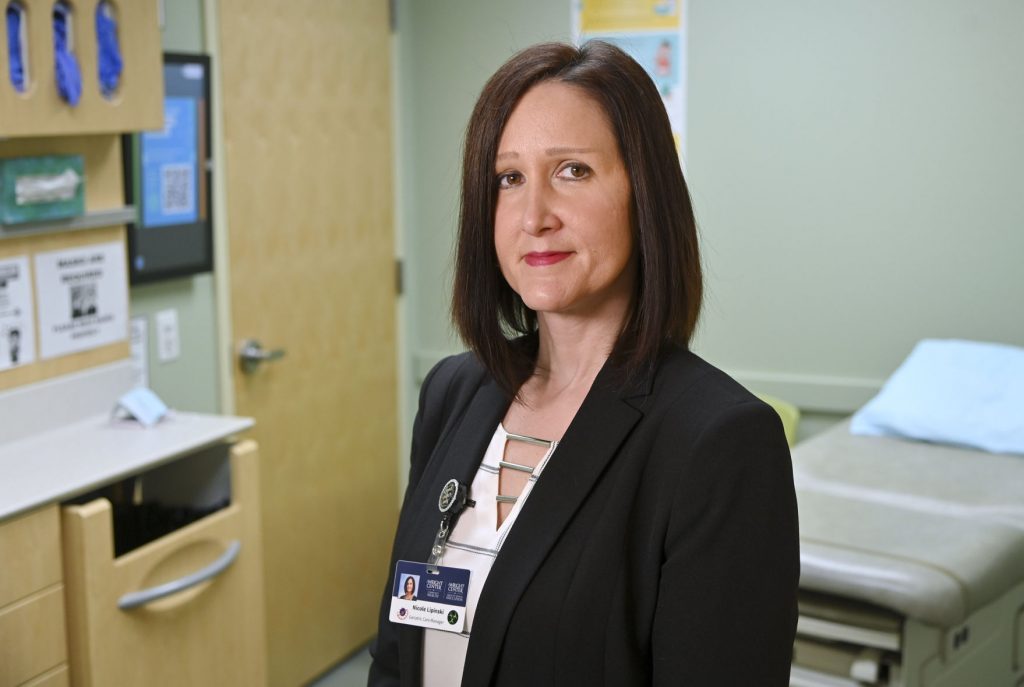Nicole Lipinski dedicated her life to a golden career.
Lipinski opted to go into nursing, specifically focused on helping the aging population of Northeast Pennsylvania. For 25 years, Lipinski has worked with both patients and their caregivers to ensure they get the most out of life and she spent the majority of her time at the Jewish Home of Eastern Pennsylvania. Caring for patients with dementia, Alzheimer’s and Parkinson’s diseases, she’s created programming specifically for those with Parkinson’s as well as advocated in the nation’s capital for people with Alzheimer’s disease and dementia.
This past summer, she started a new chapter as geriatric case manager for the Wright Center, where she works with patients, caregivers, fellows, doctors, nurse practitioners and other staff to ensure the highest quality of care for the patients and their families.
“I really feel like this was the next move for me after 25 years working in geriatric care in the region,” said Lipinski, who lives in Throop with her husband, Rob (she also has three children, Jocelyn, Jared and Cole). “There’s lots of new things we have to offer here and so many things we can do for elders in the community. It’s an exciting time right now.”
Lipinski began her career working in long-term care. She started as a nursing assistant and worked her way up to registered nurse before earning a master’s degree in health care informatics from Misericordia University. She also completed long-term care administrator licensure studies at Marywood University.
It became clear to her that she enjoyed working with geriatric patients the most and continued to gravitate toward them, especially individuals with Parkinson’s or Alzheimer’s diseases or dementia. Lipinski traces her love of working with the aging population back to her childhood, when she spent lots of time with her grandmother and great-aunts.
“They just told the best stories, and I have great memories being with them that never left me,” Lipinski said. “Even today, I love to sit down and listen to what (our patients) have to say. You can assist them with this program and that group, but most of the time, they just want you to sit and listen. … Someone with dementia can still tell you a great story about the past.”
While at the Jewish Home, Lipinski oversaw a number of different programs implemented for those with Parkinson’s disease in both Scranton and Kingston. They included Dance for Parkinson’s classes, instructed by Linn McDonald, owner and director of the Linn McDonald School of Dance in Scranton, which used dance techniques to help with fall prevention, endurance and memory for those with the disease. Other programs included Tai Chi for Parkinson’s and Pedaling for Parkinson’s to help patients with strength training, endurance and relaxation to help manage tremors. She also facilitated support groups and made connections with others involved in specialty care, including individuals such as Kathy Reap, head coach and owner of Rock Steady Boxing Northeast PA in Old Forge, which uses a non-contact, boxing-based curriculum to help people with Parkinson’s disease.
“The more you get involved with different programs and people, the more you can pool your resources and connect your (patients) together and their caregivers together,” she said. “You’re all working toward the same goal.”
As an Alzheimer’s advocate, her passion to help those with the disease even led her to Washington, D.C., where she and more than 1,200 advocates from across the country met with congressional staff to explain why it was imperative for Congress to take action against Alzheimer’s, and they asked representatives to support an increase for research funding.
While Lipinski is dedicated to her patients, part of her job also focuses on the caregivers, who have their own unique needs. When someone is sick, we expect them to look different, she said, whether it’s losing weight or looking more tired. With diseases like Alzheimer’s or dementia, however, people still look like their regular selves, but they’re not acting the same. And that’s a more difficult thing for their caregivers to process than they may realize.
Lipinski is there to offer support throughout the process, explain how the disease progresses and connect caregivers with resources and support groups. Lipinski, who also runs support groups herself at the Wright Center, noted these meetings encourage caregivers not to neglect their own health and well-being, and they also connect with others in the same position.
“Being a caregiver can feel lonely and isolating,” she said. “I think the most important thing is for them to know they’re not alone. There are other people who are going through the same thing and are able to talk about it, trade information about what’s working for the patient and even connect with community programs.”
After two and a half decades, Lipinski feels hopeful about the future of geriatric care. The program she works within at the center includes a geriatrics fellowship educational tract, which teaches new doctors and other health care care providers about how to care for that population. There also is the Geriatric Service Line, which launched in July and helps patients who have multiple chronic conditions and face the challenges of living on their own.
It includes a UCLA Alzheimer’s and Dementia Care clinic, which addresses the different medical, behavioral and social needs of Alzheimer’s disease and other types of dementia. Nurse practitioners, physician assistants and dementia care specialists work with the patient’s primary care doctor or specialist to create and implement a personalized care plan, individually tailored to each patient as well as their caregiver and family.
Still, her most meaningful experiences come directly from the patients or their families.
“It makes me feel wonderful to know I could help them just by doing something I love to do,” she said. “My heart has always been with this population.”
Meet Nicole Lipinski
At home: Lives in Throop with her husband, Rob. She has three children, Jocelyn, Jared and Cole.
At work: Geriatric case manager for the Wright Center
Inspiration: Dr. Cameron Camp, creator of Montessori-based dementia programming
Aspirations: To provide the best person-centered care for those with dementia in Lackawanna and surrounding counties; and to help caregivers understand the disease process as well as find resources to help them cope with the disease’s progression.
Diversions: Spending time with her family and watching “Law & Order” over and over
Aversion: Mistreatment of elderly people
Quote: “I’ve learned that people will forget what you said, people will forget what you did, but people will never forget how you made them feel.” – Maya Angelou

Gia Mazur is an award-winning staff writer and beauty obsessive who joined The Times-Tribune’s Lifestyles department in 2015. She’s a product enthusiast who can’t live without an eyelash curler. A proud Virgo, Charlotte Tilbury Matte Revolution Lipstick in Pillow Talk is her go-to. Contact: gmazur@timesshamrock.com; 570-348-9127; @gmazurTT



